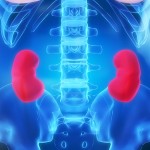 A new study found that the prevalence of kidney stones in America has almost doubled from 1994 to 2007-2010, and experts believe that it is due to a large extent to the country’s increasing rates of obesity and diabetes. In 1994, 1 out of 20 Americans had suffered a kidney stone, while from 2007-2010 that number jumped to 1 of every 11. A kidney stone is a solid mass made up of tiny crystals that forms in the urinary tract. Some stones are small enough to pass relatively unnoticed, but if they are large enough, they can cause severe pain, felt in the belly, side, back, or groin. The pain generally starts suddenly and may also go away suddenly as the stone is passed. The National Institute of Diabetes and Digestive and Kidney Diseases (NIDDK) reports that Caucasians are more prone to develop kidney stones than African Americans and stones occur more frequently in men than in women. Once a person gets more than one stone, other stones are likely to develop.
A new study found that the prevalence of kidney stones in America has almost doubled from 1994 to 2007-2010, and experts believe that it is due to a large extent to the country’s increasing rates of obesity and diabetes. In 1994, 1 out of 20 Americans had suffered a kidney stone, while from 2007-2010 that number jumped to 1 of every 11. A kidney stone is a solid mass made up of tiny crystals that forms in the urinary tract. Some stones are small enough to pass relatively unnoticed, but if they are large enough, they can cause severe pain, felt in the belly, side, back, or groin. The pain generally starts suddenly and may also go away suddenly as the stone is passed. The National Institute of Diabetes and Digestive and Kidney Diseases (NIDDK) reports that Caucasians are more prone to develop kidney stones than African Americans and stones occur more frequently in men than in women. Once a person gets more than one stone, other stones are likely to develop.
For the study, researchers from UCLA and the RAND Corp used data from the National Health and Nutrition Examination Survey (NHANES), which was gathered from 2007 through 2010. Using data from more than 12000 people, the researchers found that by 2010, 8.8 percent of Americans reporting experiencing a kidney stone, up from 5 percent in the 1990’s. Over the same period, obesity rates in the country have climbed from 23 percent in 1994 to about 34 percent today. The researchers were able to pinpoint associations between kidney stones and other health conditions, as NHANES also collects data about other health conditions, as well as height and weight. The findings suggest that obesity, diabetes and gout all increase the risk of kidney stones.
The increased risk of kidney stones is another important reason to maintain a healthy lifestyle and body weight, said the senior study author Dr. Christopher S. Saigal. He explained that more focus needs to be put on preventing kidney stones, as currently the focus is on treating those who already are suffering from the condition. Encouraging and assisting patients in maintaining a healthy diet and body weight can reduce the number of patients with kidney stones.
The study was presented this week at the annual meeting of the American Urological Association in Atlanta and will be published in the journal European Urology in July.
Related Reading:
In addition to kidney stones, obesity is associated with a number of serious and painful health conditions. Research has previously shown that there’s an association between higher BMI and reports of low back pain, but a recent study found that there is a significant association between the presence, increased extent, and global severity of disc degeneration in overweight and obese adults. You can read more about the study here.






Weight Loss Studies & Clinical